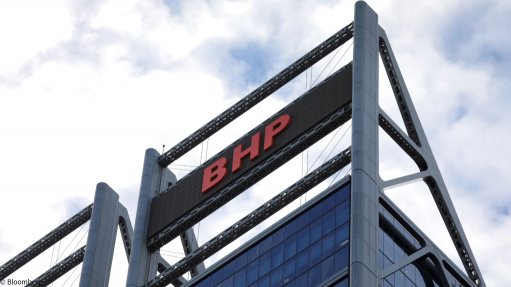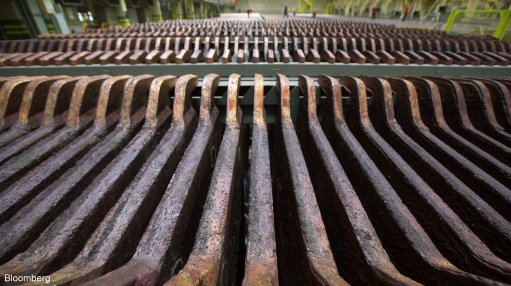BC OKs restricted restart of Mt Polley mine amid environmental protests
TORONTO (miningweekly.com) – The British Columbia provincial government has given base metals miner Imperial Metals the green light to restart partial operations at the ill-fated Mount Polley mine, after a breach of the tailings dam in August last year caused environmental havoc and a province-wide regulatory safety review.
Minister of Energy and Mines Bill Bennett and Minister of Environment Mary Polak announced on Thursday that, after careful evaluation, statutory decision-makers within the ministries of Energy and Mines and Environment had conditionally authorised the mine to start restricted operations.
“This conditional permit to restart operations is the first of three significant steps the company needs [to take] to continue [with] operations and does not include the ability to discharge water off the site. In the early fall, the company will need a second conditional permit to treat and discharge water in order for operations to continue,” said Bennett.
He added that the company would have to submit a long-term water treatment and discharge plan to government by June 30, 2016. “The mine will not be authorised to continue to operate long-term if it fails to complete either of the last two steps,” he warned.
Imperial’s subsidiary Mount Polley Mine Corporation had estimated that it would take about 30 days before it could start production now that ministry staff had amended the company’s Mines Act and Environmental Management Act permits. During restricted operations, the company expected to provide jobs for up to 220 workers.
The catastrophic failure of the tailings dam at the Mount Polley mine sent more than 24-billion litres of solid and liquid mining waste into the surrounding, salmon-bearing waters.
The amended Mines Act permit authorised the company to operate at roughly half the rate of normal operations. The tailings facility would not be used during the operation. Mount Polley would use Springer pit, an existing openpit on the mine site, to manage the tailings.
“I know the restart of the mine is welcome news for the communities of Likely, Williams Lake, 100 Mile House and the families that depend on the jobs the mine provides,” Bennett said.
The mine would be allowed to operate under certain conditions, including the provision that water and tailings levels in Springer pit remain 20 m below the top of the lowest pit edge, which was 1 030 m above sea level. Further, no discharge off the mine site was authorised, the company was not allowed to use the tailings storage facility, Mount Polley would need to pay a further $6.1-million reclamation security and the company would have to submit a five-year mine plan and a reclamation plan by September 30.
Further, Mount Polley would be required to administer an updated surface and groundwater monitoring plan by July 31, while a long-term water treatment and discharge plan must be submitted to government by June 30, 2016.
Inspectors with the Ministry of Energy and Mines would be on site during the initial start-up period and would conduct regular site inspections once the mine was operating.
Additionally, permit conditions required the company to provide weekly reports to government, First Nations, the Cariboo regional district and the community of Likely, detailing water management and water quality results. If necessary, ministry inspectors have full authority to issue stop work orders for any area of the mine found to be noncompliant.
ENVIRONMENTAL CONCERN
Meanwhile, nongovernmental organisation MiningWatch Canada on Friday expressed concern over the mine restart, arguing that the provincial government’s decision to reopen the Mount Polley mine was premature, given that Imperial Metals was still facing two investigations following the breach of the tailings dam.
“Actions do not seem to follow words. Minister Bennett and his government said they would follow all seven recommendations from the independent expert panel report released in January, including putting environmental safety ahead of pure economic interests,” the organisation’s programme coordinator Ugo Lapointe said.
He added that the ongoing investigations could lead to serious civil and criminal charges against Imperial Metals or its contractors, which, in turn, could lead to severe or costly sanctions or litigations. “This critical information should be made publicly available before even thinking of reopening the mine.”
Nearly a year after the disaster, the mining watchdog was also concerned that most of the environmental and socioeconomic costs were assumed by British Columbians and local First Nations and not by Imperial Metals.
“We are very concerned [about] the lack of detailed assessments of the costs and damages [to] the local environment, communities and businesses, as well as onto First Nations’ rights and livelihoods in the area. Who will ultimately compensate and pay the bill for all of those damages? The persistent blanket of silence on this issue is very worrisome,” Lapointe charged.
MiningWatch Canada said Thursday’s announcement was a surprise because there was still no long-term plan regarding site clean-up costs, water treatment and mining waste management.
“Ministry experts made the decision to issue the Environmental Management Act permit based on sound scientific evidence,” Polak said.
Further, MiningWatch Canada had welcomed the provincial government's recent initiative to review the provincial mining code, but warned that the review needed to be broad enough to address the full range of necessary changes following the Mount Polley Independent Expert Panel Report, the First Nations Energy and Mining Council Report, as well as the recent Auditor General Report on cumulative effects of resource development in the province.
Comments
Press Office
Announcements
What's On
Subscribe to improve your user experience...
Option 1 (equivalent of R125 a month):
Receive a weekly copy of Creamer Media's Engineering News & Mining Weekly magazine
(print copy for those in South Africa and e-magazine for those outside of South Africa)
Receive daily email newsletters
Access to full search results
Access archive of magazine back copies
Access to Projects in Progress
Access to ONE Research Report of your choice in PDF format
Option 2 (equivalent of R375 a month):
All benefits from Option 1
PLUS
Access to Creamer Media's Research Channel Africa for ALL Research Reports, in PDF format, on various industrial and mining sectors
including Electricity; Water; Energy Transition; Hydrogen; Roads, Rail and Ports; Coal; Gold; Platinum; Battery Metals; etc.
Already a subscriber?
Forgotten your password?
Receive weekly copy of Creamer Media's Engineering News & Mining Weekly magazine (print copy for those in South Africa and e-magazine for those outside of South Africa)
➕
Recieve daily email newsletters
➕
Access to full search results
➕
Access archive of magazine back copies
➕
Access to Projects in Progress
➕
Access to ONE Research Report of your choice in PDF format
RESEARCH CHANNEL AFRICA
R4500 (equivalent of R375 a month)
SUBSCRIBEAll benefits from Option 1
➕
Access to Creamer Media's Research Channel Africa for ALL Research Reports on various industrial and mining sectors, in PDF format, including on:
Electricity
➕
Water
➕
Energy Transition
➕
Hydrogen
➕
Roads, Rail and Ports
➕
Coal
➕
Gold
➕
Platinum
➕
Battery Metals
➕
etc.
Receive all benefits from Option 1 or Option 2 delivered to numerous people at your company
➕
Multiple User names and Passwords for simultaneous log-ins
➕
Intranet integration access to all in your organisation


















